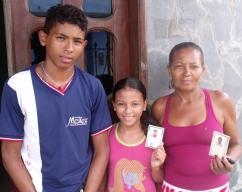Lives Transformed
The Rights and Citizenship Institute (IDC), supported by the Odebrecht Foundation, reached the mark of 300,000 people assisted in the Bahia Southern Lowland communities
21 de February de 2011
The Rights and Citizenship Institute (IDC), supported by the Odebrecht Foundation, reached the mark of 300,000 people assisted in the Bahia Southern Lowland communities
21 de February de 2011

In her quest for guidance to resolve a problem that had been bothering her for a long time, Veranisse de Oliveira, resident of the municipality of Presidente Tancredo Neves (PTN) in Bahia’s Southern Lowlands, knocked on the door of the Rights and Citizenship Institute (IDC).
Separated from the father of her seven children for two years, the stay-at-home mom supported her family by herself. In the attempt to resolve the situation, the IDC team suggested the Conflict Mediation process, which uses dialogue to try and find the best solution for those involved. “After the settlement, everything got better,” said Oliveira. “I don’t have any more problems with the father of my children. The pension is being on time. I regret not seeking out IDC sooner,” she said.
The idea to search for support at the Institute came from her daughter, Jeane de Oliveira, 23, former student of the PTN Rural Family Home – a teaching unit that, similarly to IDC, is associated with the Bahia Southern Lowlands Environmental Protection Area Mosaic Integrated and Sustainable Development Program (PDIS), instituted by the Odebrecht Foundation.
Jeane explains that the agreement was established during a hearing at the IDC. “My mother needed this support and everything was resolved with a conversation. Our family’s relationship improved,” said the youth, who currently works in the administrative area of the Pratigi Environmental Protection Area Guardian Association (AGIR), an institution that is part of PDIS, and is also the President of the Graduate Community – an initiative that gathers the former students of the teaching units to continue with their training.
At the service of the community
At the start of 2011, the IDC passed the mark of 300,000 people assisted in the Bahia Southern Lowland communities. “It is a great victory for citizenship and a result of the credibility and trust that the institution has gained,” said Maria Celeste Pereira, Executive Director of the institute. Pereira highlighted the partners’ efforts toward the practice of Participative Governance. “We have the first, second and third sectors working in an integrated and synergistic fashion to promote social inclusion,” she said.
Since 2004, IDC has helped develop citizen life by raising the community’s awareness and disseminating participative democracy by structuring and strengthening social organizations. It promotes legal advisory, supports conflict mediation actions, trains Guardianship Councils and Associations for the Rights of Children and Adolescents and issues basic free civil documentation – one of the services that also helped the Veranisse family. “I now have all of my children’s documents, including my own identification card,” said Veranisse.
The Southern Lowlands population has access to the services offered by the institute at three Rights Desks located in the municipalities of Nilo Peçanha, Presidente Tancredo Neves and Camamu. In 2010, the Justice and Citizenship Desk arrived to the Presidente Tancredo Neves and Nilo Peçanha units through a partnership established with the Bahia Court of Justice. “In this way, the agreements established will be approved by a judge,” said Pereira. “We are helping to reduce the legal demand and promote social pacification,” she said.
Do you wish to be
a partner in our projects, make
a donation or hire our technical consulting?
Send a message
right now!